In recent years, nearly half of all Americans think a civil war might happen soon, and about one in five believes political violence is okay. And it’s not just in the U.S.; globally, people are splitting into opposing camps. Many blame social media for this divide, claiming it makes us more extreme, stressed, and even depressed. The common belief is that we’re trapped in online filter bubbles, only seeing info that confirms our biases and ignoring opposing views.
However, new research suggests that this isn’t entirely true. Studies show that online, we actually encounter a diverse range of opinions. The real filter bubble exists offline. In your everyday life, you mostly interact with people who think and act like you. Your real-life bubble is way less diverse than your online one.
Our brains didn’t evolve to handle today’s digital world. They’re wired to maintain social structures crucial for survival. Thousands of years ago, living in tribes meant working together despite differences, which is why social isolation feels so awful. But social media throws a wrench in this system.
On platforms like Facebook and Twitter, your brain sorts people into “us” and “them” based on opinions. This isn’t just about tribalism; it’s more like social sorting. Online, you lack the local, social glue that helps smooth over disagreements in real life. So, people who disagree with you become your brain’s villains.
Social media amplifies this by feeding you the most contentious content to keep you engaged. Anger drives clicks, so the platforms push extreme views. This skews our perception, making it seem like everyone on the “other team” holds the worst possible opinions.
The simplification and distortion of disagreements foster hatred. We start to think of the “other team” as evil and unreasonable, and that mentality erodes the social fabric of our democracies. This is especially true in the U.S., where the two-party system exacerbates the problem.
So, what can we do? First, be aware of how social media affects your brain. Question why you believe certain things and whether you’re dismissing info based on who says it. The internet has ups and downs, and we need to adapt our brains to this new, massive flow of information.
One way to adapt is to go back to smaller online communities, like the early internet days. Bulletin boards, forums, and blogs had their own cultures and rules, resembling small villages. They didn’t have algorithms designed to keep you hooked, so you could actually log off.
These smaller communities might help reduce social sorting. Our brains aren’t evolved to cope with the massive, constant disagreement we face on social media. Until we can better handle it, separating into smaller, more manageable groups might be the answer.
Ultimately, remember that we’re all on the same team—humanity. We share this planet and its challenges. While our brains adjust, a bit of separation might just strengthen our overall unity in the long term.






